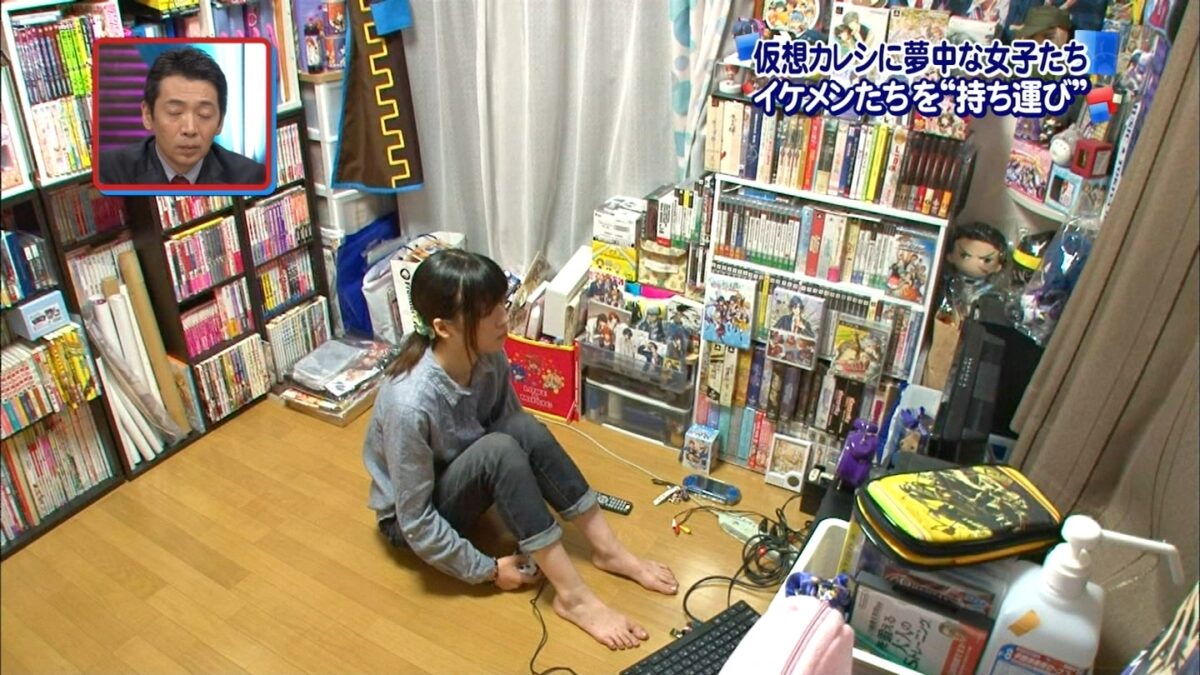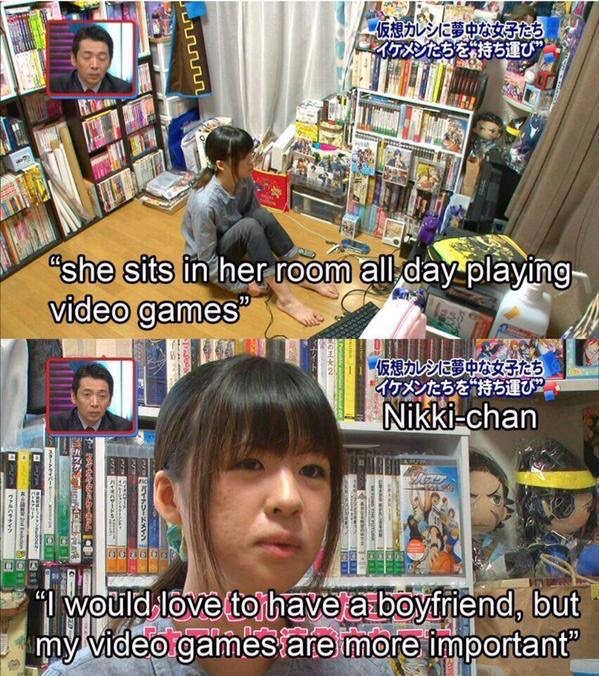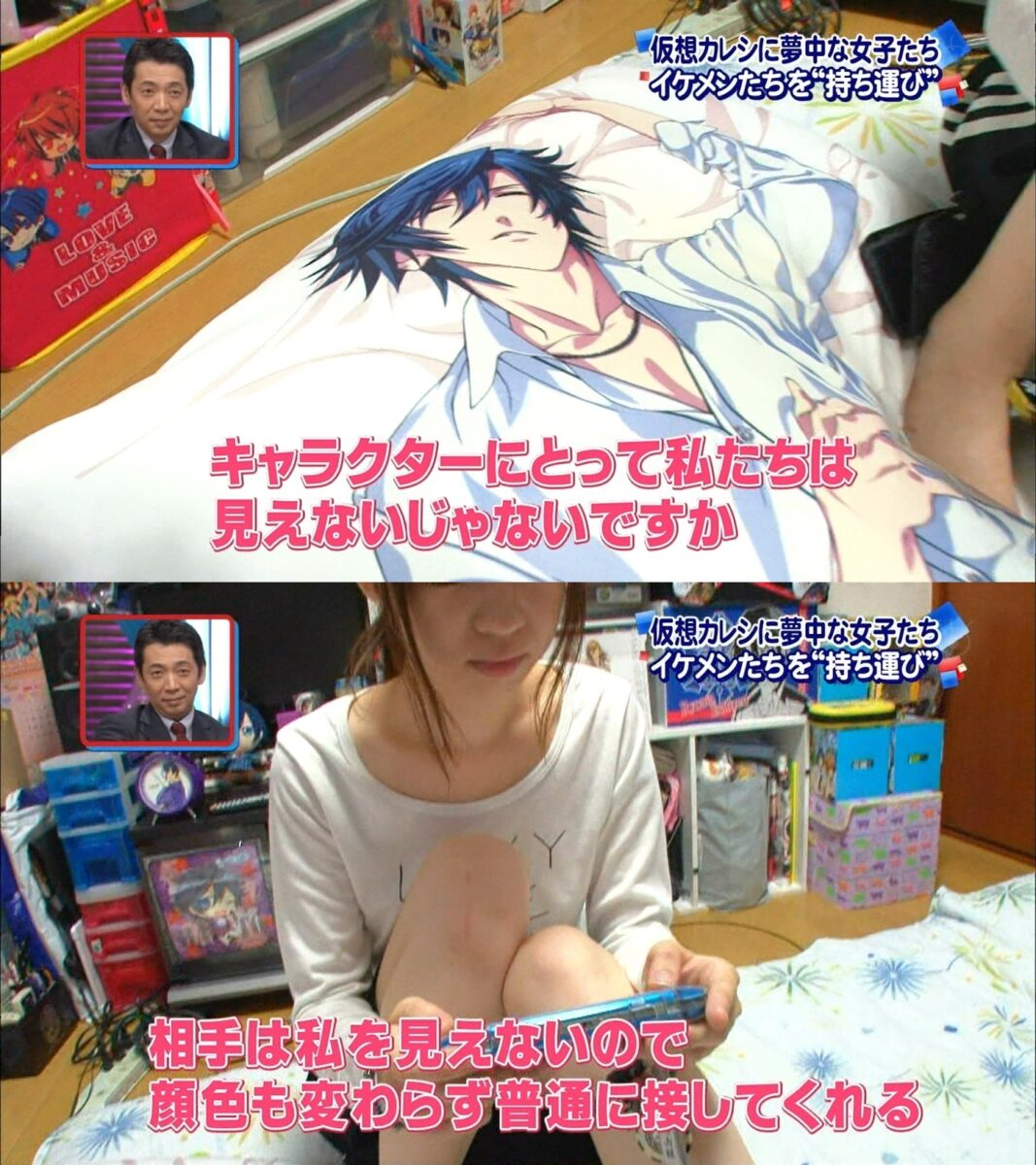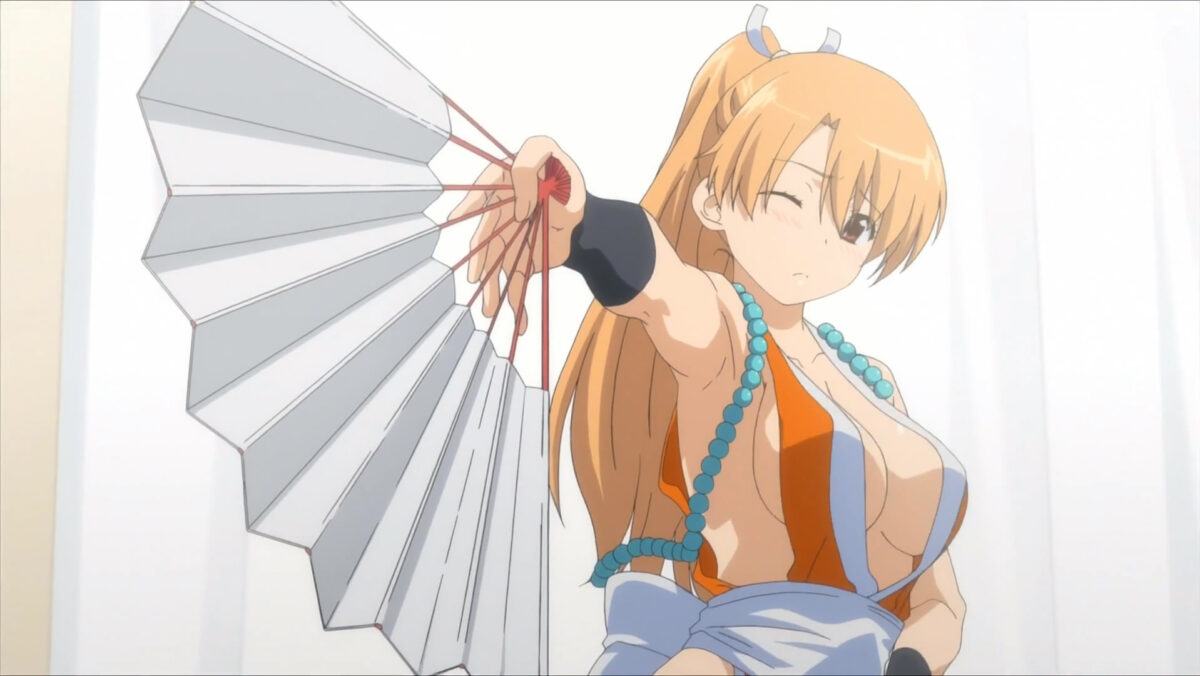You’ve probably seen the meme about an otaku girl who would love to have a boyfriend, but she’s so dedicated to her video games that she can’t leave her room. “Those wacky Japanese!” you might have thought to yourself, laughing. In this post, let’s delve deeper into this girl’s life and explore the sad world of ijime (bullying) in Japan.
Valentine’s Day is coming, and J-List is showing how much we love our customers with a big sale! Until February 15, get 15% off all in-stock products shipping from Japan automatically. Time to stock up on awesome hentai products, ero lotion, and our world-famous “dolphin polishers” from Japan! Start browsing here.
What Is the Background of the Fujoshi Meme?
We’ve all seen the meme: an otaku girl sits on the floor of her room that’s filled with manga, anime and visual novels. “She sits in her room all day playing video games,” the English text reads. In the next panel, the girl says, “I would love to have a boyfriend, but my video games are more important.” A post on Imgur reminded me of the meme and that there was more to the girl’s story. So I decided to investigate.
The clips are from a Fuji TV news piece documenting the rise of hikikomori or NEETs, young people who cannot function socially and seldom leave their rooms, and how women can be affected by this modern social phenomenon as well as men. The piece’s title was “Girls Crazy About Virtual Boyfriends: The Joy of Having a Handsome Guy to Date.”
Just as the meme of Hayao Miyazaki saying “anime was a mistake” never happened, this is a fake meme. In the lower panel, the girl is actually saying, “When I was being bullied, people called me ‘gross’ (kimoi), again and again.”
The panels continue: “The characters in the game can’t see me through the screen, right? So they deal with me as a normal person. They won’t treat me like a ‘gross otaku.'”
According to the commentary, the girl in the piece said she’d had a boyfriend for a while, but he suddenly broke up with her. The boy posted a photo of himself with another girl on social media the next day. This emotional shock of the breakup caused the girl to retreat into anime and games. There she eventually became addicted to playing the Uta no Prince-sama BL game. In the game, she could date handsome boys who would never betray her. “After that, I got a reputation for being a gross otaku girl, and people started flaming me.”
What is a Fujoshi?
The girl is a fujoshi, a word for a female otaku. When written with the kanji 婦女子, it’s an archaic word that dates back to the 1790s, and it’s a generic term for single or married women. In the early 2000s, a slang term using the alternate kanji characters 腐女子 emerged on the Japanese interwebs, changing the meaning to “rotten girl.” The term refers to female fans of BL and Yaoi pop culture.
If I’ve learned anything about Japan, it’s that there’s no limit to what people can geek out about. In addition to fans of anime, manga and games, there are history otaku (called rekijo if female), train otaku who gather at train crossings to photograph rare and famous trains, and military otaku who obsess about guns. There are even “traffic light otaku” who love to take photos of rare and complex traffic signals all around Japan.
How Do The Japanese Teach Morals?
Raising two kids in Japan was a very interesting experience. Every time Parents’ Day came along, I was happy to participate and observe my kids in class. My son was super nihon-jin, usually passing for a full Japanese unless I’m standing next to him. My daughter, meanwhile, inherited most of my American traits. Because she stood out as a gaijin more than her brother, I would spend more time in her class. This was partly to remind her classmates that she was haafu and that they should be understanding if she didn’t fit in perfectly.
Except for private missionary schools, which give a broad education that includes the study of the Bible, Japan is a secular country where religion and government are kept completely separate. (Well, except for support for the Unification Church by some Japanese politicians, which culminated in the assassination of Prime Minister Shinzo Abe.)
Japanese elementary school consists of various courses, including arithmetic, science, Japanese language, and P.E. But there’s also a “morals” class (道徳 in Japanese), which fascinated me. How can a secular country teach morals to all students without causing tension with parents? How could anyone attempt to define a single ‘morality’ that should be taught to all kids?
In one class I participated in, the teacher taught a lesson about two people trying to cross a bridge at the same time. The larger of the two people was rudely blocking the other from crossing. The lesson explored how we would feel if it were us who were being blocked by a stronger person. The end goal was to promote empathy for others, and to notice if someone was being bullied so that we might stand up for them.
Why Japan Has a Problem with Bullying (Ijime)
Our response to ideas like bullying in schools changes over time. In a different era, people might have told someone being hazed to “suck it up” or “be a man”, although we don’t react this way today.
In the hit Japanese drama Extremely Inappropriate! (Japanese title Futekisetsu ni mo Hodo ga Aru!), they brilliantly illustrate the difference in how we approach subjects like ijime. It’s about a man who timeslips from 1986 to 2024. He’s shocked to see how weak everyone has become in the future. For example, not allowing him to smoke anywhere and getting their feelings hurt if he puts pressure on them to work hard, complaining of “power harassment.” And why is everyone carrying around tiny televisions everywhere they go? What’s up with that? The show is available on Netflix, though only through a VPN as it’s not distributed outside Japan.

All cultures have bullying to a degree, but some facets of Japan’s society might make it a bigger problem here. Some of these might include:
- Homogeneity. If 98% of a country considers itself a single ethnic group, it can change how group dynamics flow. That said, there were kids from Myanmar, Bangladesh, Brazil and the Philippines in my kids’ classes, and everyone treated them normally.
- Parental issues. Japanese parents are more involved with education and make sure to form relationships with other parents. Some of this is strategic: to ensure your kids aren’t subjected to ijime because their parents don’t like you.
- Lack of awareness and empathy. Once, my daughter got teased by a classmate who pretended she was speaking English, and that he couldn’t understand what she was saying. My daughter told him, “If you go to another country, then you’ll be a foreigner there, too!” so he apologized.
If you ever wondered why Japan embraced wearing of school uniforms, look no further than episode 4 of Miss Kobayashi’s Dragon Maid. When Kana asks why she needs to buy a school uniform, Kobayashi tells her, “That’s the way it’s supposed to be. It’s to remove the distinctions between all students. Male and female. Japanese and foreigner.” Kobayashi doesn’t say it, but “rich and poor” is also part of this calculation. So that, at least for nine years of compulsory education, all students can be on the same level.
Thanks for reading this blog post exploring the meme of the otaku girl! What do you think about her situation? I certainly hope she’s doing better these days!
Let’s Chat
You made it to the end of this post! Thank you! As a token of our appreciation, enjoy an extra 5% off your next order when you use the code BLOG at checkout. Also, don’t forget to follow J-List on all our platforms!
- Twitter / X, where Peter posts anime booba for you
- Bluesky, where we post several times a day
- Facebook, where we used to share memes and discuss anime
- Discord, if you want to chat with other J-List customers of culture

Valentine’s Day is coming, and J-List is showing how much we love our customers with a big sale! Until February 15, get 15% off all in-stock products shipping from Japan automatically. Time to stock up on awesome hentai products, ero lotion, and our world-famous “dolphin polishers” from Japan! Start browsing here.



















